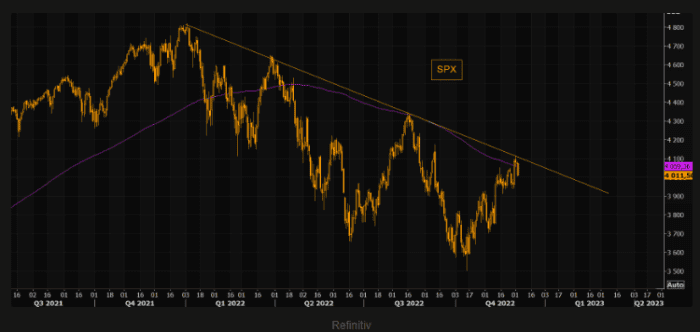This post was originally published on this site
U.S. stock indexes finished sharply lower on Tuesday to build on the previous session’s losses, as Wall Street bank executives warned of possible recession and investors assessed the Federal Reserve’s monetary policy tightening path after better-than-expected economic data.
How stocks traded
-
S&P 500
SPX,
-1.44%
fell 57.58 points, or 1.4%, to end at 3,941.26. -
Dow Jones Industrial Average
DJIA,
-1.03%
lost 350.76 points, or 1%, to finish at 33,596.34. -
Nasdaq Composite
COMP,
-5.15%
finished 225.05 points lower, or 2%, to 11,014.89.
On Monday, the Dow Jones Industrial Average fell 483 points, or 1.4%, to 33,947, the S&P 500 declined 73 points, or 1.79%, to 3,999, and the Nasdaq Composite dropped 222 points, or 1.93%, to 11,240.
What drove markets
Wall Street failed to rebound from a poor start to the week after recent stronger-than-expected U.S. economic data raised fears about further interest rate rises by the Federal Reserve.
The S&P 500 and Nasdaq Composite recorded their worst day in almost a month on Monday, following a robust survey of business condition in the U.S. service sector.
Stocks extended losses on Tuesday with the large-cap S&P 500 index logging its biggest two-day selloff in two months. Nasdaq Composite booked its worst two-day performance since early November, according to Dow Jones Market Data.
The U.S. trade data released on Tuesday showed the trade deficit rose 5.4% in October to a four-month high of $78.2 billion. The over 5% increase is a sign of weakening global demand for American goods and services.
This followed Friday’s news that the jobs market was showing few signs that the Fed’s attempts to cool the economy by sharply raising borrowing costs were yet to have a dramatic impact.
John Porter, chief investment officer and head of equity at Newton Investment Management, said what happened to the stock market on Monday was possibly a bit of “spillover effect” from the potentially “unjustified optimism” on Friday.
“I was surprised by the market’s behavior on Friday but not surprised by the way (it) behaved yesterday, because what many investors are focused on is this much discussed notion of the Fed pivot and (they are) trying to figure out when the Fed’s gonna be able to take their foot off the gas, not just a little bit, but completely,” said Porter.
“The more strong data points we get in particularly around employment, it raises the risk that the Fed is not going to be able to take their foot off the gas of tightening liquidity, or raising rates for longer than what the market is hoping for,” he told MarketWatch via phone.
See: Jamie Dimon slams cryptocurrencies as ‘pet rocks’, says they’re ‘not a real market’
Adding to the worries about the Fed will keep lifting interest rates to control price increases and eventually trigger a recession, investors also heard some downbeat economic warnings from top executives at some of the Wall Street’s largest banks. JPMorgan Chase CEO Jamie Dimon on Tuesday warned that stubbornly high inflation could trigger an economic recession next year as steep prices cause consumer spending to dry up.
“Rates are now on their way to 5%. When you’re looking forward, those things very well might derail the economy and cause this mild to hard recession people are talking about … so that may erode the economy,” Dimon said in a CNBC interview.
Goldman Sachs’ chief executive officer David Solomon also said on Tuesday that he expects a recession in the coming months, while the markets will have some bumpy times ahead and smaller bonuses and even potential job cuts should come as no surprise.
See: Goldman Sachs CEO says recession is likely, with 35% chance of a soft landing
Technical analysts noted that the market’s latest relapse came after it failed once again to break above an established downtrend.
Pointing to a chart of the S&P 500, commentators at the MarketEar.com suggested that much of the recent rally off the mid-October low was powered by those investors short the market scrambling to cover their positions rather than any fundamental bullishness. (See below)

Source: MarketEar
“The crowd did it again, covering shorts in panic. We are once again below that 200 day [moving average on the S&P 500] that got so many people excited and we saw some bears throw in the towel. A close [on Monday] here or lower and things could get ‘dynamic’ to the downside. Don’t forget the market will become less and less liquid as we approach Christmas,” said MarketEar. com.
See: Bank of America stock plunges, leading selloff in shares of largest U.S. banks
Companies in focus
-
Meta Platforms
META,
-6.79%
finished 6.8% lower after Europe’s data watchdog on Tuesday imposed decisions concerning the treatment of personal data by the owner of Facebook, Instagram and WhatsApp. -
Tesla Inc.
TSLA,
-1.44%
shares declined by 1.4% after Reuters reported Tesla planned to cut output of its Model Y by more than 20% in its Shanghai plant this month. The company said the media reports were “untrue. -
Bank of America Inc.
BAC,
-4.26%
shares tumbled 4.3% to their lowest level since mid-October. Shares of Goldman Sachs Group Inc.
GS,
-2.32%
also suffered intense selling since Monday, finishing down 2.3%. -
Textron Inc.
TXT,
+5.25%
rose Tuesday after the company announced that its Bell business won a U.S. Army development contract for the Future Long-Range Assault Aircraft (FLRAA) program. Shares gained 5.3% on Tuesday. -
AutoZone Inc.
AZO,
-2.77%
reported better-than-expected revenue and earnings Tuesday, driven by growth in both commercial and retail sales for the seller of automotive replacement parts. Shares ended 2.8% lower. -
Signet Jewelers Ltd.
SIG,
+20.25%
climbed Tuesday after the company raised its annual sales and earnings outlook for its current fiscal year. Shares jumped 20.3%.
—Jamie Chisholm contributed reporting to this article.

